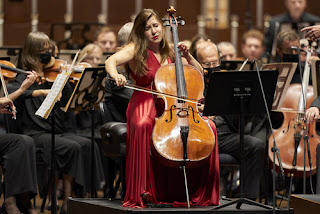It’s that time of year again. Yes, stores are all decked out in holiday decorations, the Allen Theatre lobby is filled with Christmas Trees, and local theatres are strutting their stuff doing holiday productions. Many of the venues have run out of fresh material so they are remounting scripts from the past or trying to conceive some new holiday cheer and eliminate mid-Covid angst.
An enterprising composer/writer could make a fortune writing some quality holiday shows. The theatres could sure use them.
The Cleveland Play House, after years of reprising THE CHRISTMAS STORY finally gave in this year and is trying LIGHT IT UP! which their advertising states is “a holly-jolly musical event that features original pop, rock, gospel, and jazz holiday tunes and new arrangements of traditional Christmas carols.”
Co-creator Lelund Durond Thompson states, “Coming out of the last year with the pandemic where we have been isolated and where we’ve not had the opportunity to feel, inspire, connect – we really wanted to create a piece that spoke to the need for us to really enjoy living life.”
Director Christopher Windom adds, “Where we are at this time in this moment in this year, I can’t think of anything that would be more meaningful than a dose of delight during the holiday season.”
The evening is a blend of new and old holiday songs sung by a very talented cast (Florrie Bagel, Kristina Gabriela, Matt Gittins, Brennyn Lark, Terica Marie, Gustavo Márquez, Benjamin H. Moore, Christopher B. Portley, Helen Marla White, Mariama Whyte).
The staging included “Light It Up” a rousing singing and dancing show opener, a joyous “Joy to the World,” a moving Yiddish version of “Maoz Tzurz” (“Rock of Ages”), and an inspiring “Santa Lucia,” among others.
The musicians were excellent, both as backups to the singers, as well as when they came center-stage and showcased their talents.
One might question why the decision was made to break up the wonderful singing with such trite devices as adding the Tinselville Players, playing unfunny audience participation games and faking a storyline. Musical reviews, composed of only songs and some dancing have entertained for years. There doesn’t have to be a story line, especially one that is so trite.
Capsule judgment: The cast sings well…let them sing!!! The audience was lite up when the singing and dancing were being performed! Cut out the trite tale and accent the positive!
LIGHT IT UP!, which plays through December 22, 2021 at the Allen Theatre, was developed with support of the Roe Green Fund for New American Plays.
For ticket, which range from $15 to $95, call 216.241.6000 or go on line to www.clevelandplayhouse.com.













